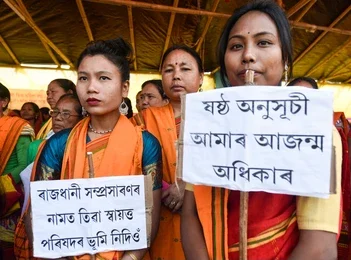In the verdant landscapes of Assam, where the mighty Brahmaputra River weaves through lush green fields and dense forests, the Tiwa community stands as a testament to the state’s rich cultural diversity. However, behind the picturesque scenery lies a tale of struggle and aspiration, particularly for Tiwa students who are now raising their voices for long-overdue recognition and support from the government.
The Tiwa community, primarily concentrated in the districts of Morigaon and Nagaon in Assam, has historically faced challenges in accessing quality education and adequate governmental representation. Despite their significant cultural contributions to Assamese society, Tiwa students have often found themselves overlooked when it comes to educational opportunities and infrastructural development.
Recently, Tiwa students have mobilized to demand concrete actions from the government to address their grievances and uplift their community. At the forefront of their demands is the establishment of a Tiwa Autonomous Council (TAC), a long-standing aspiration aimed at securing greater autonomy and decision-making power over matters affecting their community. The TAC would not only provide a platform for self-governance but also ensure that policies and initiatives are tailored to the specific needs of the Tiwa people.
Education forms the cornerstone of their demands, with a fervent plea for improved infrastructure and facilities in schools located in Tiwa-dominated areas. Many schools in these regions lack basic amenities such as proper classrooms, sanitation facilities, and libraries, severely hampering the quality of education provided to Tiwa students. The demand for increased funding and resources is not merely for academic enhancement but also for fostering a conducive learning environment that nurtures their cultural identity and heritage.
Central to their struggle is the recognition of the Tiwa language and culture within the state’s educational curriculum. Tiwa students argue that inclusion of their language and cultural studies in school syllabi is crucial for preserving and promoting their unique heritage. This recognition is seen not just as a matter of cultural pride but also as a means to ensure that future generations of Tiwa youth remain connected to their roots amidst a rapidly changing socio-cultural landscape.
Moreover, Tiwa students are advocating for better representation in government jobs and educational institutions. They highlight the need for reserved quotas and scholarships specifically earmarked for Tiwa students, ensuring equitable opportunities in higher education and employment sectors. This demand stems from their perception of systemic exclusion and underrepresentation in state institutions, hindering their socio-economic progress.
The plight of Tiwa students has garnered attention beyond Assam, drawing support from various civil society organizations and political leaders sympathetic to their cause. Efforts are underway to amplify their voices through peaceful demonstrations, petitions, and dialogues with government officials, aiming to secure tangible commitments towards their empowerment and development.
In response, the Assam state government has initiated dialogues with Tiwa student leaders to address their concerns constructively. Promises of infrastructural improvements in schools, discussions regarding the formation of a Tiwa Autonomous Council, and commitments towards inclusive educational reforms have been made. However, Tiwa students remain cautiously optimistic, emphasizing the need for concrete actions and timely implementation of promises made by the authorities.
As the sun sets over the tea gardens and mist-covered hills of Assam, the voices of Tiwa students echo across the landscape, resonating with hope and determination for a brighter future. Their demand for government action and recognition is not just a plea for justice but a reaffirmation of their resilience and commitment to shaping a more inclusive and equitable society in Assam. It is a call to honor their cultural heritage, empower their youth, and ensure that no community is left behind in the march towards progress and prosperity.


